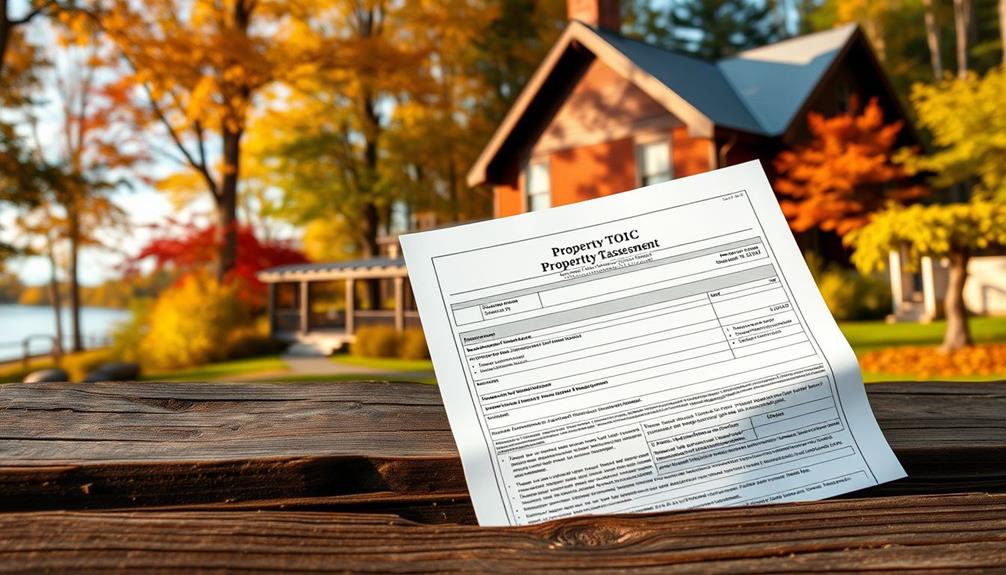In the state of Maine, withdrawals from your IRA are subject to state income tax, ranging from 5.8% to 7.15%. You must include these withdrawals on your Maine tax return. If you are 65 or older, you might be eligible for some exemptions on pension income, but not on IRA withdrawals. Early withdrawals before age 59½ may result in a 10% additional tax, and failing to take required minimum distributions can lead to severe penalties. If you are interested in exploring charitable giving options or other tax benefits related to managing your retirement funds, there is more to learn about effectively handling your finances after retirement.
Key Takeaways
- IRA withdrawals in Maine are subject to state income tax rates ranging from 5.8% to 7.15%.
- Individuals aged 65+ can deduct up to $45,864 from pension income, which includes IRA distributions.
- Early withdrawals from IRAs incur a 10% additional tax, and SIMPLE-IRAs impose a 25% penalty in the first two years.
- Required Minimum Distributions (RMDs) must start at age 72 for traditional IRAs, with penalties for non-compliance.
- Qualified Charitable Distributions (QCDs) from IRAs are excluded from state taxable income for those aged 70½ and older.
Overview of Maine Tax Policies

When it comes to understanding Maine's tax policies, it's vital to know how they impact retirement income. Maine employs a progressive state income tax system, which means your retirement income is taxable at rates ranging from 5.8% to 7.15%. This includes distributions from IRAs, so it's important to plan accordingly.
However, there are some favorable aspects too. For instance, Social Security benefits are exempt from state income tax, making Maine an attractive option for retirees relying on those benefits.
If you receive pension income, you can benefit from tax exemptions on amounts over $10,000, providing relief for those with substantial pension distributions. It's important to factor this into your overall retirement strategy.
Additionally, keep in mind that Maine has an estate tax with an exemption threshold of $6.8 million, markedly lower than the federal threshold. This could impact your estate planning if you have considerable assets.
To navigate these complexities, consider using Maine's financial advisor matching tool. It can help you find a professional who understands these tax policies and can assist you in developing effective tax strategies for your retirement income.
Taxation of IRA Withdrawals

Understanding the taxation of IRA withdrawals in Maine is essential for effective retirement planning. When you make distributions from traditional IRAs, SEP-IRAs, or SIMPLE-IRAs, you'll face state income tax rates that range from 5.8% to 7.15%. These withdrawals count as taxable income, which can impact your overall tax liability.
Here's a quick overview of key tax implications for IRA withdrawals in Maine:
| Aspect | Details |
|---|---|
| Social Security Benefits | Exempt from state income tax |
| Pension Income Deduction | Up to $45,864 for individuals aged 65+ (2024) |
| First $10,000 Exemption | Applies to pension income alongside IRA withdrawals |
If you're 65 or older, you may benefit from the pension income deduction, potentially lowering your taxable income. Remember, the first $10,000 of pension income is also exempt from Maine taxes. Always report your IRA withdrawals on your Maine tax returns, and consider consulting with a tax advisor to guarantee compliance and optimize your tax situation effectively.
Impact of Early Withdrawals

Facing early withdrawals from your IRA can lead to significant financial repercussions. If you take distributions before reaching age 59½, you'll likely face a 10% additional tax on top of your withdrawal amount. In Maine, this tax is compounded by state income tax rates that can reach up to 7.15%. This means that each dollar you withdraw not only impacts your retirement income but also incurs a hefty tax burden.
For SIMPLE-IRAs, the stakes are even higher. If you withdraw funds within the first two years, you could be hit with a staggering 25% additional tax, plus the standard 10% penalty.
It's essential to recognize that even divorce-related early distributions won't exempt you from the 10% penalty under Internal Revenue Code section 72(t).
Whenever you make IRA withdrawals, remember you must report these on Form 1040, regardless of age. If additional taxes apply, you'll also need to attach Form 5329.
In Maine, understanding both federal and state tax implications is vital to avoid unexpected financial strain when accessing your retirement savings early.
Required Minimum Distributions

As you approach age 72, it's important to understand the Required Minimum Distributions (RMDs) you'll need to start taking from your IRA.
These withdrawals can have significant tax implications, especially if you don't take the full amount, which could lead to hefty penalties.
Knowing the rules around RMDs helps you manage your retirement funds effectively.
RMD Age Requirements
When it comes to Required Minimum Distributions (RMDs), knowing the age requirements is essential for managing your retirement funds effectively. For traditional IRAs, SEP-IRAs, and SIMPLE-IRAs, you must start taking your RMDs at age 72. This is a change brought about by the SECURE Act for those who turned 72 after December 31, 2019.
If you were born before July 1, 1949, you may have previously had an RMD age of 70½.
Roth IRAs, however, are exempt from RMD requirements during your lifetime, allowing your retirement distributions to grow tax-free for a longer period.
It's vital to calculate your RMD correctly; you do this by dividing your account balance as of December 31 of the previous year by the IRS's applicable distribution period based on your life expectancy.
Failing to take your required minimum distribution can lead to severe penalties — specifically, a 50% tax on the amount you should have withdrawn.
Keep these RMD age requirements in mind to avoid unnecessary state taxes and penalties as you navigate your retirement planning.
Tax Implications of RMDs
Understanding the tax implications of Required Minimum Distributions (RMDs) is important for managing your retirement finances effectively. Once you hit age 72, you must begin withdrawing RMDs from your traditional IRAs, which are considered taxable retirement income.
In Maine, these distributions are subject to state income tax rates ranging from 5.8% to 7.15%. This can greatly impact your overall tax liability.
It's essential to calculate your RMD correctly, as failing to take the required amount can result in severe penalties—equal to 50% of the amount you should've withdrawn. You'll need to report these RMDs on your Maine state tax returns, as they contribute to your taxable income.
On a positive note, if you have a Roth IRA, you won't face RMD requirements, allowing you to keep your funds invested longer and potentially reducing your taxable income in retirement. This flexibility can be a valuable tool in your tax strategy.
To conclude, understanding how RMDs affect your state income tax is fundamental to avoid penalties and optimize your retirement income in Maine.
Qualified Charitable Distributions

If you're 70½ or older, Qualified Charitable Distributions (QCDs) can be a smart way to support your favorite charities while enjoying tax benefits.
By donating directly from your IRA, you can reduce your taxable income and meet your Required Minimum Distribution (RMD) obligations.
Let's explore the eligibility requirements and how to report these distributions accurately to maximize your tax savings.
Tax Benefits of QCDs
Maximizing your charitable giving can be achieved through Qualified Charitable Distributions (QCDs), which allow individuals aged 70½ or older to donate up to $100,000 directly from their IRAs to qualified charities without facing federal income tax on those amounts.
Additionally, incorporating strategies like IRA Rollover to Gold can further enhance your retirement planning and charitable impact.
Here are some key tax benefits of QCDs:
- Reduce Taxable Income: QCDs help you lower your federal taxable income since these distributions aren't counted as taxable income.
- Fulfill RMDs: If you're required to take Minimum Distributions (RMDs), QCDs can satisfy that requirement while keeping your taxable income in check.
- State Tax Benefits: In Maine, QCDs aren't included in your state taxable income, offering you additional tax savings.
- Simplified Reporting: When you report QCDs on Form 1040, the total amount distributed is shown, but the taxable portion is zero—making your tax treatment easier.
For retirees, utilizing QCDs can be an effective strategy to support charities while minimizing both federal and state taxes.
Eligibility Requirements Explained
To make the most of Qualified Charitable Distributions (QCDs), it's important to know the eligibility requirements. First, you must be at least 70½ years old to take advantage of QCDs, which allow you to donate up to $100,000 directly from your traditional IRA to qualified charities without incurring federal income tax on those distributions. This can also help satisfy your Required Minimum Distributions (RMDs), effectively reducing your taxable income.
Here's a quick overview of the eligibility criteria:
| Requirement | Details |
|---|---|
| Age | Must be 70½ or older |
| Account Type | Must come from a traditional IRA |
| Maximum Donation | Up to $100,000 per year |
| Charity Type | Must be a qualified charity |
| Tax Reporting | Must report full amount on Form 1040 (taxable amount is zero) |
Keep in mind that if your traditional IRA includes after-tax contributions, you'll need to file Form 8606. Also, consider consulting a tax advisor to understand how these distributions may impact your state income tax obligations in Maine.
Reporting QCDs Accurately
Accurate reporting of Qualified Charitable Distributions (QCDs) is essential for maintaining compliance with tax regulations and maximizing your tax benefits.
If you're aged 70½ or older, you can make tax-free donations directly from your traditional IRA to qualified charities, which can also satisfy your Required Minimum Distributions (RMDs).
Here's how to report QCDs accurately:
- Check Form 1099-R: This form will show the distribution amount for the year. Make sure it reflects your QCD.
- Complete Form 1040: When reporting QCDs, list the taxable amount as zero. This keeps your adjusted gross income lower, enhancing your tax situation.
- Use Form 8606 if necessary: If you have a basis in your IRA or the QCD is from a Roth IRA, you need this form for proper reporting.
- Remember the limit: You can exclude up to $100,000 per year per individual as QCDs.
Social Security Tax Exemption

Living in Maine offers retirees a significant advantage when it comes to their Social Security benefits, as these funds are completely exempt from state income tax. This tax exemption means you can retain more of your retirement income, making your financial situation more manageable. For low and moderate-income retirees, this exemption is particularly beneficial, helping to reduce your overall tax burden.
Here's a quick comparison of how Maine's tax policy stacks up against other states regarding Social Security and retirement income:
| State | Social Security Tax | Pension Tax | Overall Tax Burden |
|---|---|---|---|
| Maine | Exempt | Taxed | Lower |
| New York | Taxed | Taxed | Higher |
| Florida | Exempt | Exempt | Lower |
| California | Taxed | Taxed | Higher |
Understanding these nuances can help you make informed decisions about your retirement. While you enjoy the tax exemption on Social Security, be mindful that other forms of retirement income, such as IRAs and pensions, are still subject to state income tax in Maine.
Property Tax Considerations

Property taxes in Maine can pose a considerable challenge for retirees, with an effective rate of approximately 1.28%, higher than the national median. This translates to an average property tax payment of around $2,722, which can greatly impact your retirement income if you're on a fixed budget.
However, there are several options to help ease this burden:
- Homestead Exemption: If you're a permanent resident, you may qualify for this exemption, reducing your property taxes.
- Property Tax Assistance: Maine offers additional programs specifically designed for seniors, providing further relief from property tax obligations.
- Senior Veterans: If you're a veteran, you could be eligible for a $6,000 exemption, which can make a noticeable difference in your tax payments.
- Income Limitations: Some assistance programs have income limitations, so it's important to check if you qualify based on your financial situation.
Comparison With Other States

When comparing state tax implications for IRA withdrawals, Maine stands out for its relatively high tax rates, which range from 5.8% to 7.15%. This contrasts sharply with states like Florida and Texas, where there's no state tax on retirement income, making them more financially appealing for retirees.
If you're considering moving for tax benefits, these states are certainly worth a look.
In neighboring New Hampshire, you won't face income tax on IRA withdrawals, but be aware of their high property taxes that can offset those savings.
Meanwhile, Massachusetts taxes IRA distributions at rates that can hit as high as 9%, depending on your income bracket.
Maine does offer a pension income deduction of $35,000 for 2023 and $45,864 for 2024, which can help reduce your overall tax liability.
This is a benefit not found in many Tax-Friendly States, making Maine somewhat more accommodating in this regard.
If you're weighing your retirement options, analyzing these state tax implications can greatly impact your financial well-being during retirement.
Always consult with a tax professional to navigate these complexities effectively.
Frequently Asked Questions
Does the State of Maine Tax IRA Distributions?
Yes, Maine does tax IRA distributions. You'll face state income tax rates ranging from 5.8% to 7.15%, depending on your income level. It's essential to plan effectively to minimize your tax liabilities.
Do You Pay State Income Tax on IRA Withdrawals?
Yes, you pay state income tax on IRA withdrawals. The amount varies based on your income level, so it's essential to plan accordingly, especially if you're receiving other retirement income alongside those distributions.
What States Have Mandatory State Tax Withholding on IRA Distributions?
In some states, mandatory state tax withholding on IRA distributions can feel like a financial avalanche! States like California, New York, and New Jersey impose such requirements, while others, like Florida, don't tax at all.
Do I Have to Pay Taxes When I Withdraw From My Traditional Ira?
Yes, you'll have to pay taxes when you withdraw from your traditional IRA. The withdrawn amount counts as income, so it's subject to both federal and state taxes, depending on where you live.
Conclusion
Steering through Maine's tax landscape can feel like walking through a dense fog, but understanding these implications makes the path clearer. As you consider IRA withdrawals, picture the warmth of your hard-earned savings working for you, even amid tax burdens. Embrace the knowledge of early withdrawals, required distributions, and charitable options, and let it guide your decisions. With careful planning, you can illuminate your financial future, ensuring the beauty of your retirement shines through the mist.









